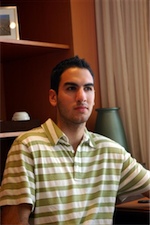On April 27, Condoleezza Rice went to a reception at a Stanford University dormitory, which was followed by a private dinner with some of the students. Stanford undergrads Jeremy Cohn and Sammy Abusrur took the opportunity to pose some demanding questions, while a third Stanford student, Reyna Garcia, captured the event on film. The tape was posted to the Internet and quickly worked its way on to the news in the U.S. and around the world. I discussed the event with Cohn and Abusrur.
Q: What gave rise to your sparring match with Condoleezza Rice?
Cohn: First of all, I should say that I never intended our conversation to become a “sparring match.” I knew that my questions were not soft questions, but I specifically went in with the intention of keeping my words civil.
I had seen an email a few weeks ago advertising that Rice would be coming to my dorm to speak with and have dinner with several students. I immediately signed up to be in the pool from which the students would be randomly selected. I thought about the questions that I might ask, though I really doubted that I would be able to ask anything, especially once I was told I was not one of the students selected for the dinner. I went to the meet and greet, which was open to the dorm as a whole, and as students began to leave, I approached Rice, though only after encouragement from one of my friends.

After my second question things became less civil, but you can watch the video and make your own decision about how things developed. She began to get defensive after my comment regarding World War II. After that our conversation wasn’t as polite.
Abusrur: I am a freelance photographer and was photographing Rice as she conversed with students at the Roble dormitory at Stanford. It bothered me that almost all of the students–except for the ones protesting outside–seemed thrilled to see her. They were simply lobbing banal questions and comments at her. Weren’t they aware of her history as National Security Advisor and Secretary of State in the Bush Administration? Finally Jeremy began asking Rice about Abu Ghraib and Guantánamo. I was disappointed when she deflected his questions with patronizing comments and finger-wagging. Rice’s defensive attitude prompted me to consider asking her a question, so I put down my camera and told her that I had a question. I told her about the recent report I had read concerning her approval of the use of torture by the CIA, and she objected, and I said, “not torture, waterboarding.” She seemed happy at that. Then it struck me to ask her whether she thought waterboarding was a form of torture. First, she replied that she did not authorize anything but just “conveyed” the authorization of the administration. At the time, her claim struck me as being similar to the Nuremberg Defense. Then I repeated my question: was waterboarding torture? Her response that, “By definition, if it was authorized by the president, it did not violate our obligations under the Conventions Against Torture,” sounded eerily like President Richard Nixon’s infamous response to David Frost: “When the president does it, that means that it is not illegal.” I was delighted with her very revealing response. In fact, it was the highlight of my four years at Stanford.
Q: What kind of reaction have you gotten after the YouTube video began to circulate?
Cohn: Mostly positive. Several students, alumni, and locals have sent me positive emails thanking me for my part. People around campus have recognized me and shaken my hand and voiced their approval. They were happy that I posed tough questions, and several also noted that Rice was evasive. On the other hand, one student told me that he “did not think I was as smart as Rice.” Another student told me he thought Rice’s responses were accurate and appropriate.

Abusrur: It’s been a unique experience. I had absolutely no idea that a video even existed before a friend sent me the link to it. I was excited that it had been captured on video; I was able to share my experience with my family and friends. Once the video spread around campus via email lists and Facebook, friends poured in their support. One friend started calling me Sammy “Frost” Abusrur.
Q: Rice kept insisting to you that she had to grapple with tough choices. How successfully do you think she did that? Did her eight years of stewardship as National Security Advisor and then Secretary of State leave the world a better place?
Cohn: It’s true that she had to deal with some enormously difficult choices. However, I have wondered and continue to wonder about many of her actions since 9/11. And I do wonder about our diplomatic progress in the past few years.
I think the reputation of the United States suffered. Many of the Administration’s actions reflect poorly on the United States: holding prisoners indefinitely without trial, utilizing interrogation methods that many consider torture, decrying the human rights violations of one nation while remaining silent about the violations of our allies. Whether we like it or not, many nations believe that the United States violated international treaties with our treatment of detainees and enemy combatants. These perceptions of the United States affect how we interact with every other nation and its people. And ultimately these perceptions do affect our security.
Abusrur: I am not a political scientist, nor an international relations major, so I am not going to pretend that I am an expert on this subject. However, in my opinion, Condoleezza Rice’s eight years in the Bush Administration were a disaster for the United States. Evidence has shown she failed to act on intelligence warning of the 9/11 terrorist attacks, approved torture, and finally, unconditionally supported Israel’s campaigns in Lebanon and Gaza, which resulted in the deaths of hundreds of innocent Lebanese and Palestinian children, women, and men. Therefore, I don’t think history will look back kindly on Condoleezza Rice. Indeed, the Bush Administration left the world in a worse state than it found it.


